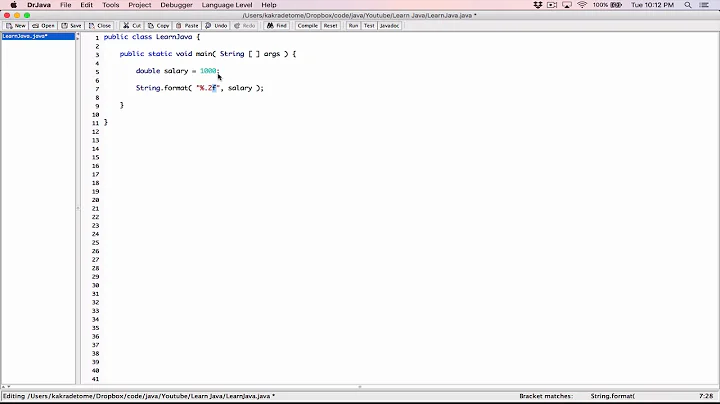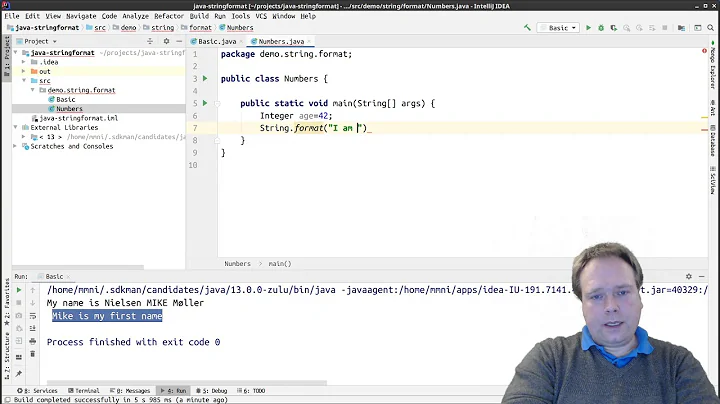Use str.format() to access object attributes
Solution 1
You can use the .attribute_name notation inside the format fields themselves:
print 'My object has strings a={0.a}, b={0.b}, c={0.c}'.format(obj)
Below is a demonstration:
>>> class Test(object):
... def __init__(self, a, b, c):
... self.a = a
... self.b = b
... self.c = c
...
>>> obj = Test(1, 2, 3)
>>> 'My object has strings a={0.a}, b={0.b}, c={0.c}'.format(obj)
'My object has strings a=1, b=2, c=3'
>>>
Note however that you do need to number the format fields when doing this. Also, as you can see, the str.format function has its format fields denoted by curly braces {...}, not the % sign.
For more information, here is a reference on the Format String Syntax in Python.
Solution 2
I think it's preferable to use vars() to access an object's attributes as a dict rather than usng __dict__.
So you could do this:
"My object has strings a={a}, b={b}, c={c}".format(**vars(obj))
For more background on why vars() is preferable to __dict__, see the answer to the question Use dict or vars()?.
Solution 3
As @igniteflow wrote in a buried comment:
'My object has strings a={a}, b={b}, c={c}'.format(**obj.__dict__)
With my limited python understanding: .__dict__ is a dict with all the instances attributes and the ** operator basically unpacks them and adds them as key=value args to the method
Solution 4
For the sake of completeness, building on @igniteflow and @Christian, you could use the % string format operator and write:
'My object has strings a=%(a)s, b=%(b)s, c=%(c)s' % obj.__dict__
Solution 5
Some of the suggested answers that rely on vars(...) don't work with immutable objects:
>>> class foo(object):
... __slots__ = ()
... def __init__(self):
... self.x = 1
...
>>> vars(foo())
Traceback (most recent call last):
File "<stdin>", line 1, in <module>
File "<stdin>", line 4, in __init__
AttributeError: 'foo' object has no attribute 'x'
I think it's preferable to stick with something reliable and explicitly list what you need to be printed.
If you need to print a ton of attributes then storing those values as attributes might not be the best idea.
Related videos on Youtube
Comments
-
 Adam Hughes almost 2 years
Adam Hughes almost 2 yearsI have a Python object with attributes
a,b,c.I still use old string formatting, so I'd normally print these manually:
print 'My object has strings a=%s, b=%s, c=%s' % (obj.a, obj.b, obj.c)Lately, my strings have been getting super long, and I'd much rather be able to simply pass the object into a string format function, something like:
print 'My object has strings a=%a, b=%b, c=%c'.format(obj)However, the syntax is incorrect. Is this possible?
-
Roman L over 9 yearsThis looks better to me:
print 'My object has strings a={obj.a}, b={obj.b}, c={obj.c}'.format(obj=obj) -
 Adam Hughes over 9 yearsAwesome guys, thanks. Does the "0." (e.g. 0.a) denote the index of the item passed to format?
Adam Hughes over 9 yearsAwesome guys, thanks. Does the "0." (e.g. 0.a) denote the index of the item passed to format? -
 Admin over 9 years@AdamHughes - Exactly. Python begins numbering at
Admin over 9 years@AdamHughes - Exactly. Python begins numbering at0just like C/C++.0is the first (only) argument tostr.format. -
 Admin over 9 years@RomanL - The OP disliked his current solution because it required you to type
Admin over 9 years@RomanL - The OP disliked his current solution because it required you to typeobjonce per attribute. Writingobjthat many times is tedious and unnecessary IMO. But, as you said, it is mainly a matter of preference. :) -
 Adam Hughes over 9 yearsThat's right, but I still appreciate seeing the alternative approaches. I was unaware of both cases!
Adam Hughes over 9 yearsThat's right, but I still appreciate seeing the alternative approaches. I was unaware of both cases! -
Roman L over 9 years@iCodez:
0andobjare repeated the same number of times within the string. A realistic example with a shortened obj:'a={o.a}, b={o.b}'.format(o=my_actual_object_name). To someone not familiar with this notation this is much more obvious than0.aIMO. -
igniteflow almost 9 yearsAlso
'{a} {b}'.format(**vars(obj))or'{a} {b}'.format(**obj.__dict__) -
Halcyon Abraham Ramirez almost 9 years@iCodez can you this to access class methods as well? or just class attributes?
-
 Admin over 8 years@HalcyonAbrahamRamirez - You can access methods, yes, but you will not be able to call them. Instead, you will get a string representation of the method like:
Admin over 8 years@HalcyonAbrahamRamirez - You can access methods, yes, but you will not be able to call them. Instead, you will get a string representation of the method like:<bound method Class.method of <__main__.Class object at 0x0000000002CC27B8>>'. -
pythonjsgeo over 8 yearsNice! Using '**' is the key. Including .__dict__ in the example is unfortunate because it makes it look more complicated than it is. e.g. 'My object has strings a={a}, b={b}'.format(**{'a':'hi', 'b':'mom'})
-
Shiplu Mokaddim over 4 yearsif you define
__slots__there is no__dict__, thenvarswouldn't work at all.






